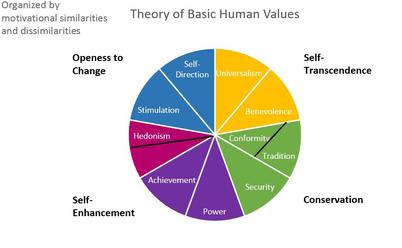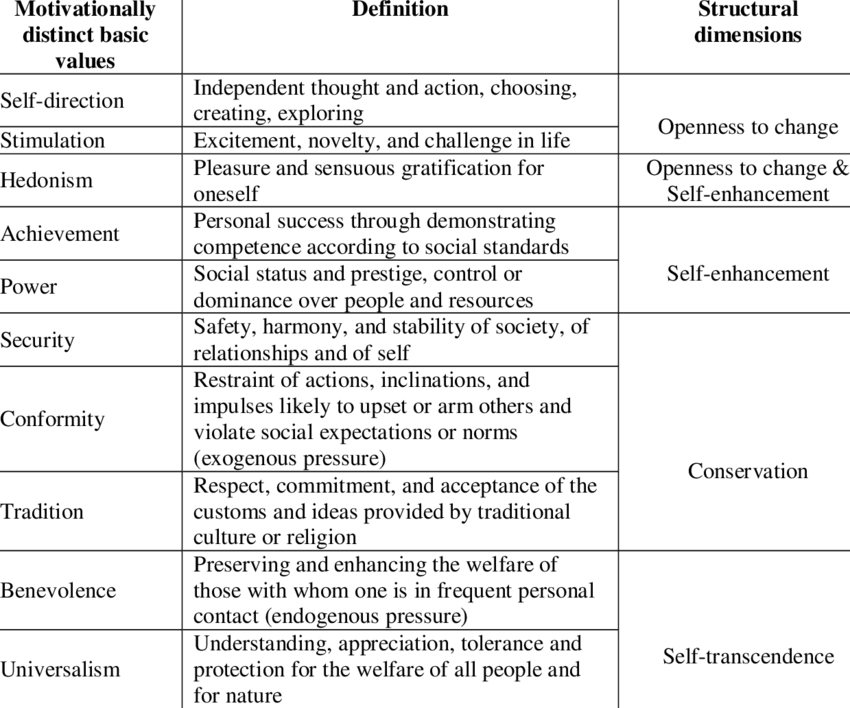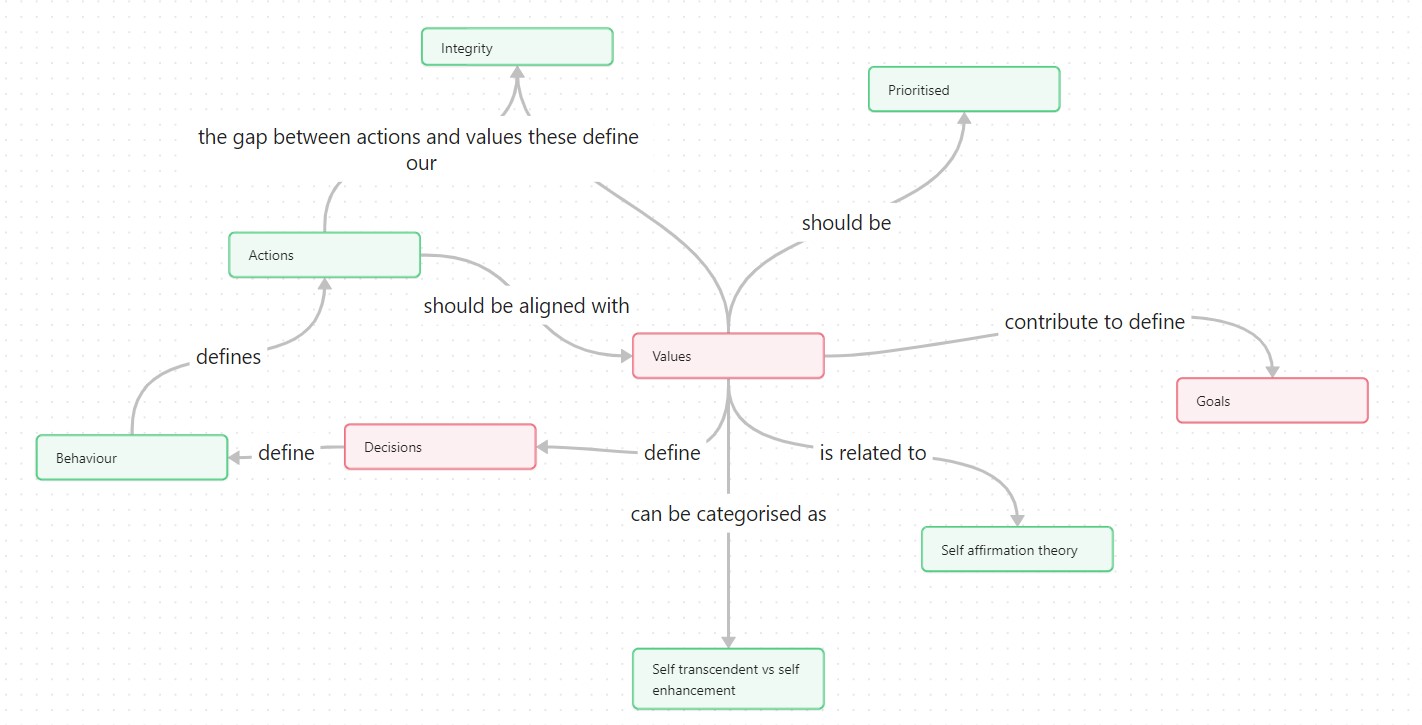Values
The topic of the importance to know our own life values to be happy is present in several books and courses (Benjamin Franklin – An American Life, Drive, Finding Purpose and Meaning In Life: Living for What Matters Most, Hagakure: The Book of the Samurai, Introduction to Self-Determination Theory, The Happiness Trap ).
So I decided to know more about it.
What are life values?
Life values are:
- what is important for a person in his life.
- beliefs
Why do we have life values?
Life values help us to decide how to behave in our life and what is the right thing to do. Therefore life values define our actions.
This is how our brain works.
Imagine that you have a difficult decision to make and you are in doubt about two different actions to do. Having clear life values can help you to decide clearly.
What define our life values?
Our life values are mainly defined by:
- what we have been taught
- the experiences we lived
- the meaning we gave to those experiences
- the culture where we grew up, that is the set of shared values that characterise a group.
- what we think is good for us
How to create culture?
Creating culture is essential to share values in a group. Some strategies to create culture within a group are:
- Educate by example.
- Communicate values frequently
- Show benefits of living with the values you want to follow.
What kind of life values exist?
Theory of Basic Values by SH Schwartz found that there are ten values universally recognised.
 Universals in the content and structure of values: Theoretical advances and empirical tests in 20 countries. SH Schwartz. 1992.
Universals in the content and structure of values: Theoretical advances and empirical tests in 20 countries. SH Schwartz. 1992.
 https://www.researchgate.net/figure/Value-Types-in-Schwartzs-Values-Theory_tbl1_257360051
https://www.researchgate.net/figure/Value-Types-in-Schwartzs-Values-Theory_tbl1_257360051
The values can be categorised in four categories:
- Openess to Change
- Self-Transcendence
- Self-Enhancement
- Conservation
Is better to follow some categories of values over others to reach well-being?
Self-transcendence values are values related to other people well-being.
Self-enhancement values are values related to our own pleasure over other people well-being.
Self-transcendence values are the ones related to eudaimonia and lead to intrinsic motivation that is when you are motivated by something for its satisfaction and not for some external rewards.
Self-enhancement values are the ones related to hedonia and lead to extrinsic motivation that is when you are motivated by something because of a external reward. (See Happiness).
Researches suggest that:
- intrinsic motivation has a strong positive relation with happiness. Therefore is likely to be happy if you are driven by intrinsic motivation.
- extrinsic motivation has a negative relation with happiness. Therefore is less likely to be happy if you are driven only by extrinsic motivation.
- you need to find a balance between different values to be happy
To find a balance is necessary to prioritise/weigh what values are more important.
Therefore:
- it is better to find a balance that resonate for you
- it is more likely to be happy if you value more self transcendent values over self enhancement values.
It is like for foods. You may have a favourite food like pizza. When you eat pizza, you are very happy because it is your favourite food. However you can not eat only pizza. You have to balance your diet eating also other foods to be healthy, otherwise you could develop diseases and finally do not be happy also if you always eat your favourite food.
What is the relation between values and purpose?
Values are what is important in life. They are principles that drives your life.
While purpose is a way, a role that we have in life that makes us happy doing what it is important for us.
If we consider the above definitions true, I think that values and purpose should by definition be aligned and not in conflict.
In fact, if the values and purpose are in conflict, likely the values or purpose are not the true authentic values and purpose of this person because ones would not be related to what it is important for him.
Therefore if there is a conflict between values and purpose, then it is necessary to reflect more about our priorities to find the authentic values and purpose.
Instead I think that it is very important that the actions we make should be aligned with the purpose and values. I think that it is not the purpose itself that can be not aligned with the values, but the actions we do to pursue the purpose.
Although if there may be cases where purpose seems hardly aligned with some values, I think that is almost ever possible to find ways, so actions, that align both with values and purpose.
Let’s say there is a company whose value is environmental sustainability and the main purpose is to maximise the company gain. They seem hardly to align, however I think that there are actions that the company can do to maximise the company gain being environmental sustainable. Maybe it is difficult, but it is not the value that is in conflict with the purpose, but the actions that the company decides to do that could be in conflict with the values or the purpose. Otherwise could be value or the purpose that are not the authentic ones. Maybe the authentic value is not environmental sustainability but it is power or success the main company value, or it is the authentic purpose that is not to maximise the company gain but make the world a better place to live making products that are environmental sustainable or simply maximising the company gain making environmental sustainable products.
What is integrity?
Integrity means that your actions are aligned with your values.
To really show integrity what you say should be aligned with what you value and how you behave should be aligned with what you say.
Why is integrity important?
A lot of authors I admire highlight the importance of integrity in life (Benjamin Franklin, Daniel Goleman, Chip e Dan Heath, Daniel Pink, Russ Harris).
I think that integrity is important too because if you do not behave in a way that is aligned with what matters to you, you won’t be happy in the long term.
Therefore I believe integrity can lead to happiness in the long term. However be integer could arise conflicts and challenging situations in some day to day decisions.
I think that also in this case is necessary to find a balance between showing integrity and in some occasions behaving in a way not completely aligned with your values for example in cases when the action required to be integer would go against people you care but that have different values.
Exploring the concept of integrity I found that it is a very complex topic and it is not simple to find a conclusion and it is more a topic that a requires philosophical inquiry.
Is possible to measure how much we are coherent to our values?
-
In scientific researches, the Valued Living Questionnarie is used.
-
Benjamin Franklin used a method to improve himself that consisted in:
- Writing the values more important in your life.
- Writing the behaviours and actions needed to satisfy these values.
- Keeping a daily score about if a particular value has been satisfied or not in that day.
Is worthy to invest time to define your values?
Considering that:
- Values define your behaviours and so your actions.
- Actions you make contribute to define if you are happy. Therefore I think it is important to invest some time to clarify and prioritise your values.
How to balance your values?
To balance your values:
- Find your values
- Weigh your values and prioritise them in order of importance
- Make a plan in order to dedicate time to do action aligned with your values. The time should be divided following the weight and priorities defined in the previous step. So more time should be dedicated to what it is more important to you and less time to what has lower priority. However no one value should be neglected. It is important to find the right proportion between values.
- Put your plan in action.
- Try to measure your happiness to see if the life is well-proportioned.
- Correct if needed.
How to find your life values?
Two exercises useful to reflect on your values are:
- Self-affirmation intervention exercise
- Valued Living Questionnaire (VLQ)
Self-affirmation intervention exercise
One exercise used in the self-affirmation interventions is to:
- Read a list of values like this one:
- Accuracy
- Altruism
- Ambition
- Approval
- Athletic ability
- Beauty
- Belonging
- Calm
- Caution
- Cheerfulness
- Cleaning
- Cleverness
- Coherence
- Compassion
- Competence
- Collaboration
- Commitment
- Correctness
- Courage
- Creativity
- Credibility
- Curiosities
- Determination
- Devotion
- Dignity
- Discipline
- Discretion
- Duty
- Education
- Efficiency
- Elegance
- Empathy
- Equilibrium
- Equity
- Experience
- Ethics
- Fame
- Family
- Flexibility
- Frankness
- Freedom
- Friendship
- Frugality
- Fun
- Generosity
- Gratitude
- Greediness
- Harmony
- Health
- Honesty
- Honor
- Humility
- Humor
- Independence
- Intelligence
- Intimacy
- Justice
- Kindness
- Learning and gaining knowledge
- Loyalty
- Obedience
- Order
- Organization
- Patience
- Perfectionism
- Perseverance
- Politics
- Positivity
- Power
- Practicality
- Pride
- Punctuality
- Realization
- Reputation
- Resolve
- Respect
- Sacrifice
- Safety
- Serenity
- Simplicity
- Sincerity
- Spirituality
- Success
- Sympathy
- Trust
- Trustworthiness
- Uniqueness
- Wealth
- Choose the value or the three values that you feel are important for you
- Write for about 10 minutes about why these value are important for you and when you have used them.
Valued Living Questionnaire (VLQ)
See here.
How to change your values?
Because our values are defined by what it is reported in What define our life values?, then to change values you can:
- make new experiences different from what you are used to do.
- rethink to the meaning you gave to the experiences you lived and see if you can give another meaning.
- explore other cultures and what they value.
- question your thoughts and what you believe is true.
- listen people that have values different from you
My current Conclusions about Values
- If you follow your values and you are not happy, likely the values you are following are not what really matters for you. Probably they are values imposed by others. In this case it is necessary to find and change your life values.
- It is more important to concentrate on living following our values instead of searching happiness. Happiness is an outcome of living following our values.
- It is important to find the right proportion between the various activities related to the different values prioritising what values are more important.
- Life values define behaviour and therefore the actions you do.
- Action should be aligned with values to be happy.
- If you want to change your actions and behaviours, then you have to change your values.

References
- An Overview of the Schwartz Theory of Basic Values. SH Schwartz. 2012.
- Universals in the content and structure of values: Theoretical advances and empirical tests in 20 countries. SH Schwartz. 1992.
- Value Priorities and Subjective Well-Being: Direct Relations and Congruity Effects. Lilach Sagiv, Shalom H Schwartz. 2000.
- Orientations to happiness and life satisfaction: the full life versus the empty life. C Peterson, N Park, MEP Seligman. 2005.
- The Eudaimonic and Hedonic Components of Happiness: Qualitative and Quantitative Findings. A Delle Fave, I Brdar, T Freire, D Vella-Brodrick, MP Wissing. 2011.
- Further examining the American dream: Differential correlates of intrinsic and extrinsic goals. Kasser, T., & Ryan, R. M. 1996.
- Psychological Flexibility as a Fundamental Aspect of Health. Todd B. Kashdan. 2010.
- Benjamin Franklin – An American Life. Walter Isaacson.
 My Learning Notes
My Learning Notes
Comments